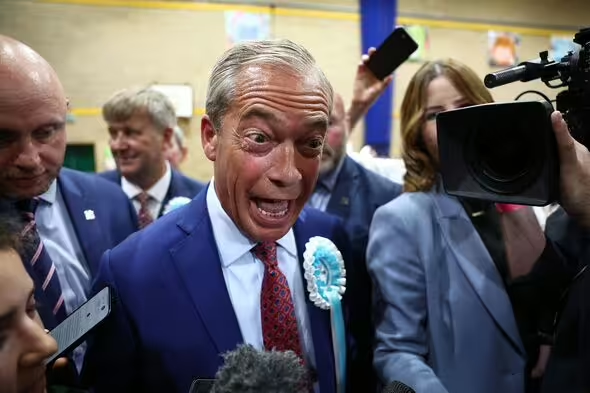The two traditional parties of power risk humiliation if Reform UK continues to win over voters who believe the political establishment has let them down

Reform UK leader Nigel Farage is a major problem for both the Labour and Tory leaders (Image: Getty)
SIR Keir Starmer and Kemi Badenoch show little affection for one another when they face off across the despatch boxes at Prime Minister’s Questions but the duelling party leaders have much in common.
For each of them, 2025 is a crunch year in which they need to win back the trust of a sceptical electorate. The Labour and Tory leaders must persuade traditional supporters that Nigel Farage’s Reform UK is not the answer to the nation’s problems.
Sir Keir managed to pull off a staggering majority in the summer with a paltry 34 per cent of the vote. By Christmas the share of the electorate saying they would vote Labour had crashed to 27 per cent.
Meanwhile, the Conservatives command the support of only around one in four voters. This decline and stagnation contrasts with Reform which scored 14 per cent in the summer election and is now backed by around a fifth of the electorate.
Sir Keir will wonder if the polls are this bad just six months after his landslide how much further support will fall by the time of the traditional mid-term blues?
The May local elections should be a golden moment for Mrs Badenoch to humiliate Labour and signal that the Tories have crawled out of their abyss. The hitch is that the last time these elections took place Boris Johnson was enjoying huge success (the Hartlepool by-election – a high point in the Johnson premiership – was on the same day) following the roll-out of Covid-19 vaccines.
If Reform UK takes swathes of votes from both the Conservatives and Labour – potentially also winning mayoralties – there will be panic at the party HQs.
Sir Keir’s mood may darken further when he flicks through his to-do list for 2025 and sees the potential crises stretching out in front of him.
If pensioners who lost the winter fuel allowance die in the coming weeks he can expect even more fierce protests outside Downing Street. And if Labour fails to deliver education improvements as a result of hitting fee-paying schools with VAT this will look like a churlish act of class warfare.
Militant public sector unions who won bumper settlements last year will not hesitate to threaten strikes if they feel the Treasury is in Scrooge mode, and Left-wingers will be appalled if proposals for disability benefits reform are seen as a ruthless cash grab.
Meanwhile, farmers and family businesses will not give up their fight for a u-turn on inheritance tax changes – and if the increase in employers’ national insurance contributions damages growth then confidence in the Government will crumble further.
Sir Keir has made igniting growth and improving living standards a centrepiece of his ambitions. The trouble is, negotiating new trading arrangements with the EU is fraught with political risk – especially if Brussels does not back down on demands for fishing rights and greater freedom of movement for young people.
And if the soon-to-be President Trump hits Britain with tariffs and gets embroiled in a trade war with the EU and China then the stage is set for a true economic crisis.
Sir Keir confronts all these challenges while keeping an eye on threats to our national security. If Russia secures a ceasefire that allows it to hold onto Ukrainian territory then key allies in eastern Europe will fear they will be the next on the Kremlin’s list of targets.
There is immense pressure on Britain to raise defence spending to 2.5 per cent and encourage Nato partners to do likewise but there will be howls of anguish across Whitehall if departments face cuts in the spending review. Chancellor Rachel Reeves cannot allow public services to collapse on her watch but if she hikes taxes in the Budget then she will be portrayed as a crazed socialist stamping out growth.
Energy secretary Ed Miliband will want the UK to play a leading role in salvaging global efforts to tackle climate change at the November’s Cop summit. But the rush to net zero risks becoming a political liability if rural constituencies revolt against plans for new pylons and wind farms.
Meanwhile, the pressure to stop the boats will continue. But if Syria dissolves into a new chapter of civil war Europe can expect a surge in refugees.
If friendly centre-Left parties take a hammering in elections in Australia, Canada and Germany, worry will deepen among Labour MPs they are on the slow road to disaster.
Sir Keir’s future may hinge on the success of his sometime rival Angela Rayner. If she delivers a housebuilding revolution which allows people across Britain to become homeowners while fuelling growth then he will have every reason to send her very generous Christmas presents.
Legions of Britons loved Margaret Thatcher for allowing them to buy their council houses. Labour badly needs its own dose of Maggie magic; the keys to electoral success will be the ones held in the hands of first-time buyers.




